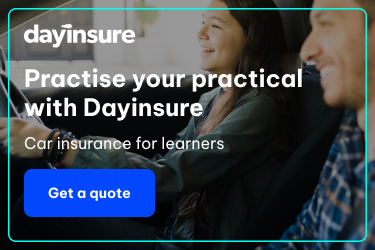Choosing your Driving Instructor

Choosing your driving instructor is something which should be taken seriously. There are many factors which will determine which one is right for you and it should never be based purely on cost.
Read our guide below, written by Diane Hall of L of a Way 2 Pass, which should lead you to make the right decision.
Cost per lesson v. value for money
What do you think is the FIRST question that pupils ask a driving instructor when enquiring about lessons? It’s definitely ’how much do you charge?’
Now, the question is, how relevant is cost? Well, pretty damn relevant I’d say, as you want to know that you are getting good value for money. Now, good value for money is a whole different ballgame to ‘cheap’. The DSA quote that the average number of professional lessons it takes to pass your driving test is about 45. So, if you were to pay an instructor say £26.00 an hour, 45 hours would cost you £1,170.00. However, if another instructor charged £5.00 per hour more then for the same number of lessons, it would cost you £1395.00, which is a lot more expensive.
At first glance, it would seem that you’d be better off paying £26.00 per hour. BUT…. you have to ask yourself why is the other instructor charging so much more? Well, it could be that he’s overcharging for his service, but that’s pretty unlikely as he wouldn’t be in business for long because pupils wouldn’t be prepared to pay that amount of money if he wasn’t a good instructor. Therefore, the most likely explanation is that he is a good instructor, and charging a higher rate because he’s worth every penny! If the good instructor teaches you to a higher standard in a shorter time and you get through your test in fewer lessons and in fewer test attempts, then you have to ask yourself: ‘which instructor is better value for money?’ The answer is obvious, isn’t it?
Choosing your driving instructor
You now know that ‘how much’ isn’t the most important question that you should be asking a prospective driving instructor, so what should you be asking? Well, if I was going to part with several hundred pounds, I’d like to know that I’d be getting someone professional, friendly, competent at their job, and who I liked! You are going to be spending a lot of time with your instructor, and it’s imperative that you feel comfortable with him/her. If you take lessons from an independent instructor, the likelihood is that it will be them that you speak to when you initially enquire about lessons if booking by phone; however, if you book with a larger company, then ask to speak to the instructor who will be taking you for lessons before you commit. By doing this, you haven’t parted with a lot of money only to find that you don’t ‘gel’ with your instructor.
Trainee/Qualified Driving Instructors – Pink or Green Badge
Every Driving Standards Agency approved Driving Instructor must display their badge in the windscreen of their tuition vehicle. This will either be pink or green. To qualify as an Instructor, we have to pass three exams; a theory test, a driving test, and a test of instructional ability. A green badge means that your instructor has successfully passed all three exams. If your instructor is displaying a pink badge, this means that they have completed all their training and have successfully passed the first and second exam. However, they still have to pass their final instructional ability exam.
DSA allows instructors to teach under a ‘trainee licence’ for up to six months while they gain experience before taking their final exam. This does seem odd as you wouldn’t expect a trainee surgeon, who hadn’t fully qualified to operate on you. There are lots of different views on this subject and it’s heavily debated. One viewpoint is that it would be silly to have lessons with a trainee instructor with little experience compared with an experienced instructor. However, others would argue that a trainee instructor has been trained in the latest techniques and is more up to date than an instructor who has been teaching for 30 years and hasn’t updated their own training. Ultimately it’s your choice of who you feel comfortable with. I would suggest that the following questions will help you to decide.
Continuing Professional Development
Unlike many professions, updating our own professional development and teaching skills isn’t compulsory. This is unheard of in other professions as you would expect your doctor to be up to date with all the latest developments, and also that your instructor has kept up to date with his/her own development. Don’t be afraid to ask not only what grade they are, but also what additional courses, training or development they have done. If your doctor told you that it wasn’t necessary to keep up with latest developments and techniques as they qualified 30 years ago, would you let them operate on you? Likewise, do you want to trust your tuition to someone who isn’t prepared to update their own knowledge? Please don’t think the instructor will be offended by this question; if they are, then I’d look elsewhere. To be honest, it would be a lovely refreshing change to have a new pupil ring me up and ask me what additional training I’ve done rather than ‘how much’, as it would show me that they were committed to learning and taking it seriously.
Messing your instructor about!
I’ve just been talking about your driving instructor being a ‘professional’, so please treat him/her with the professionalism that they deserve. I’ve had pupils ask me if they can pay for their lesson next week because they can’t afford it. What do you think the answer would be if you went into Next for a pair of jeans and asked them if you could have them but not pay for them until next week? It’s also common for pupils to cancel lessons at the last moment, or not to be there for their lesson. This means your instructor is losing his/her income.
I appreciate that it’s not always possible to keep your lesson; you may be ill, called into work, babysitter let you down at the last moment etc., but please consider the effect on your instructor if you cancel your lesson. We can lose hundreds of pounds each month due to cancellations. Likewise, your instructor should be professional, and if they are late, should always make up the time. It’s a two-way process; please treat each other with respect.
Independent Instructors v. National Companies
How often have you heard someone say; ‘Don’t have lessons with AA/BSM/RED (or whichever large school is in your area) they’re rubbish’, or ‘have lessons with AA/BSM/RED (again any school), they’re great’. Each instructor pays a franchise fee to trade under a company name, and therefore there are going to be a selection of instructors working for a variety of companies. The instructor that your friend had with BSM (or whoever) may have been brilliant, but that doesn’t mean that you will have the same instructor. Therefore, ask for the instructor by name if they have been recommended to you. Ultimately it’s the instructor that’s important, not necessarily who they work for.
Additional Services
Many instructors offer additional services, such as help with the theory test, handouts, lesson plans and much more. Pupils vary dramatically in their own learning style, and a good instructor will tailor the lessons to your individual needs. Your instructor should discuss with you a structured training programme from theory through to your practical test.
I’ve been a driving instructor for ten years, and I’ve lost count of the number of conversations I’ve had with prospective pupils who make comments like; “I don’t feel like I’m progressing” or “my instructor makes me do the same thing every lesson”. The problem is that until I’ve seen them drive, I don’t know whether it’s an issue with the instructor or the fact that the pupil is not grasping something and therefore the instructor has to keep repeating it.
You can’t move on until the pupil has mastered what’s being taught. If you do feel that you are not progressing in your lessons, firstly talk to your instructor. Explain how frustrated you feel about your lack of progress and what they suggest.
If you still feel that you’re stuck in a rut, most companies offer an assessment lesson; sometimes at a reduced rate, or two hours for one etc.
By having another instructor’s opinion you are better placed to judge why you are in a rut.
I’m sure I speak for all instructors when I say that if a pupil isn’t happy with their progress I would much rather they talk to me about it rather than just going elsewhere.
I consider myself to be a professional, and hope that my pupils respect my judgement; therefore, please, before you go to another instructor, talk to your own instructor first.
Fastpass/Intensive/Crash courses v. weekly lessons
Lots of driving schools offer fastpass/intensive/crash courses which are aimed at you passing your driving test in record time, often starting on Monday with your driving test on a Friday (if of course, you have already passed your theory test).
In principle, these are a good idea because you will spend a lot of time in the car and therefore don’t have time to forget what you have learned.
However, the flip side to this is that your brain doesn’t have much time to process the huge amount of information that it’s being asked to take in, which can easily lead to ‘information overload’.
How many times have you been in a classroom or at work for several hours without a break? You just tend to ‘shut down’, don’t you?
Well, it’s the same with learning to drive.
For this reason, I prefer not to do a one week course, because traditionally the fail rate is usually higher than when pupils have learned to drive over a longer period of time.
Also, if you start driving on a Monday with your test on a Friday, then the last date to cancel your driving test without loss of fee is Monday! Therefore, if you are not ready for your driving test by the Friday then one of two things happen; firstly you cancel the test with the loss of fee, currently £62.00, or you take your test, fail and guess what; still lose the test fee.
It’s more sensible to spread your lessons out a bit and give your brain a chance to learn and have a greater chance of passing your test on your first attempt.
Having said all of this, fastpass/intensive/crash courses do have their place, and instructors will do them if they feel that it is the best method for the pupil. If on the other hand you don’t go for an intensive course and elect to drive for just one hour a week, then the opposite can happen, and you forget lots of what you have learned. Therefore, if possible, it’s best to have a happy medium.
“My friend passed in fewer lessons than me” – why? The answer is very simple; we are all different! If we were all the same, we’d all play football like Wayne Rooney, have a brain like Einstein and sing like Pavarotti!
It may be that your friend is very fortunate and driving just comes naturally to them. This may seem unfair, but you can be sure that there’s something that you are much better at than your friend. However, it could also be that you and your friend are being taught by different instructors and that your friend’s instructor teaches more effectively.
It’s perhaps worth having a lesson with your friend’s instructor – at least you’d know then whether it’s the instructor or the fact that you don’t seem to pick up learning to drive as naturally as your friend.
If this is the case, and you feel you don’t have the ‘learning gene’, then all is not lost. Have a look at the Baseline Confidence and Baseline Competence chapters in L of a way 2 Pass, and you will find your ‘driving gene’ almost miraculously seems to appear!
Regardless of whether you choose to learn on a weekly basis or take up a fastpass/intensive/crash course, then the techniques in the book can help you to stay calm and focused, and also help you to remember more from each lesson.
Join the Learner Hub community!
Would you like more help, tips, advice and support from our welcoming Facebook Group specially devoted to making sure you pass your Theory and Practical Driving Test?
Just click on the image below and join over 3,500 active like-minded learner drivers and driving instructors to get even more advice!



